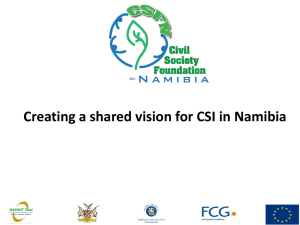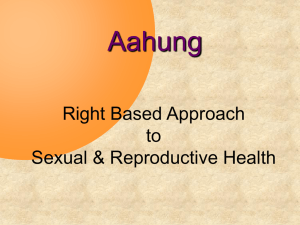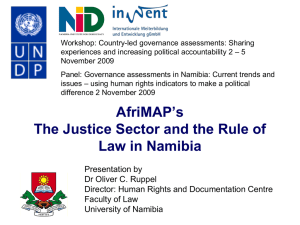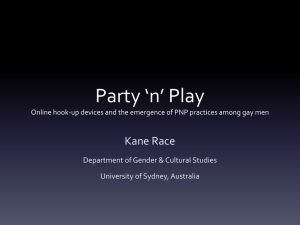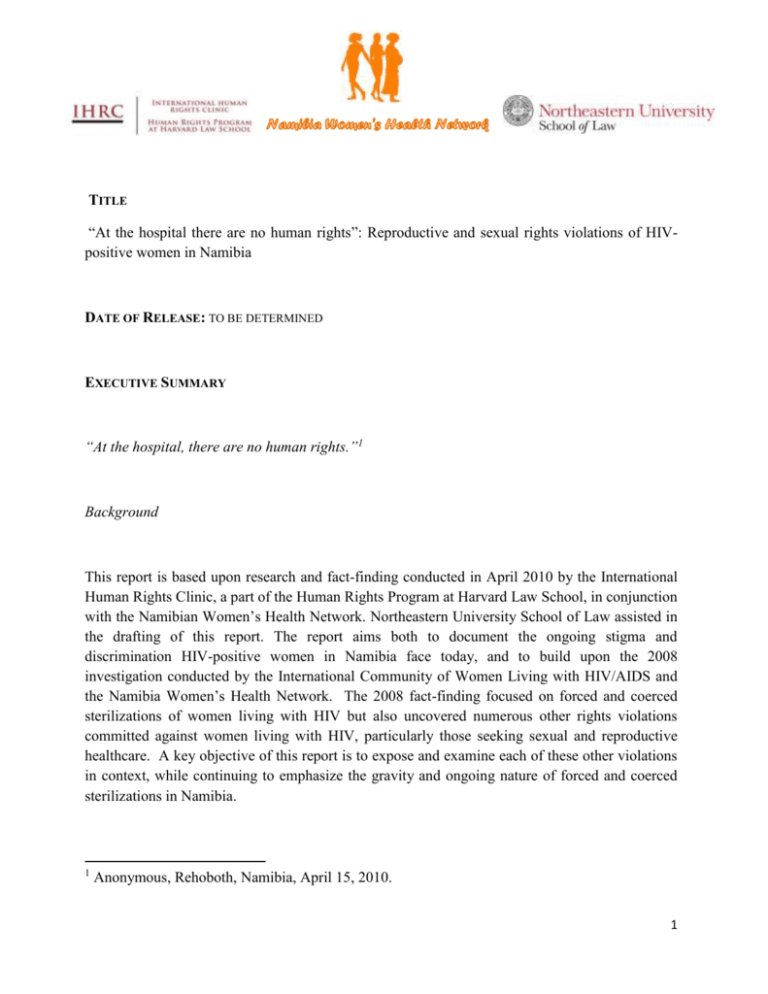
TITLE
“At the hospital there are no human rights”: Reproductive and sexual rights violations of HIVpositive women in Namibia
DATE OF RELEASE: TO BE DETERMINED
EXECUTIVE SUMMARY
“At the hospital, there are no human rights.”1
Background
This report is based upon research and fact-finding conducted in April 2010 by the International
Human Rights Clinic, a part of the Human Rights Program at Harvard Law School, in conjunction
with the Namibian Women’s Health Network. Northeastern University School of Law assisted in
the drafting of this report. The report aims both to document the ongoing stigma and
discrimination HIV-positive women in Namibia face today, and to build upon the 2008
investigation conducted by the International Community of Women Living with HIV/AIDS and
the Namibia Women’s Health Network. The 2008 fact-finding focused on forced and coerced
sterilizations of women living with HIV but also uncovered numerous other rights violations
committed against women living with HIV, particularly those seeking sexual and reproductive
healthcare. A key objective of this report is to expose and examine each of these other violations
in context, while continuing to emphasize the gravity and ongoing nature of forced and coerced
sterilizations in Namibia.
1
Anonymous, Rehoboth, Namibia, April 15, 2010.
1
Methodology
A team from the International Human Rights Clinic traveled to Namibia in April 2010, where it
joined with the Namibian Women’s Health Network to conduct a two-day training for female
community leaders in Windhoek, as well as conduct a series of individual interviews and focus
groups with over ninety women and twenty men from four Namibian communities: Katatura;
Havana (Hakkanah); Rehoboth; and Dordabis. While the vast majority of participants were
selected through their affiliation with HIV-related support groups in the designated communities,
a minority of participants joined the study after expressing interest to the Namibian Women’s
Health Network.
Key Findings
1. Stigma and Discrimination in the Context of Sexual and Reproductive Rights
Participants in interviews and focus groups conducted by researchers from the International
Human Rights Clinic and the Namibian Women’s Health Network report that HIV-positive
women who attempt to access sexual and reproductive healthcare in Namibia find their rights
violated in two key ways.
First, participants report that medical personnel systematically neglect the needs of HIV-positive
women in their care, particularly during childbirth. Rather than assisting in the birthing process,
as they do with HIV-negative women, medical personnel allegedly ignore pleas for help and care
from HIV-positive patients, in some cases waiting until after childbirth to approach the mothers.
Second, participants emphasize that hospital delivery facilities are designed in a discriminatory
manner, separating HIV-negative patients from those who are HIV-positive. This emphasis on
patients’ different statuses serves to highlight the stigma attached to women living with HIV at a
moment when many are overcome with stress and feeling particularly vulnerable. Instead of
being free to focus on delivering a healthy child, HIV-positive women are forced to confront their
status and the stigma and disdain with which many in their society view them.
2. Violations of Informed Consent
2
Testing
Participants report that women tested for HIV in Namibia are not provided beforehand with
sufficient counseling or information to allow for informed consent. Medical personnel in
Namibia’s public healthcare facilities often do not speak the same language as their patients and
translation is rarely available. As a result, miscommunication and misunderstanding is rampant.
Such circumstances do not afford women the opportunity to make an informed choice regarding
HIV testing, and many participants report that women can feel pressured into allowing a test
without fully understanding the reasons behind it, or the potential consequences of a positive or
negative outcome.
Forced and Coerced Sterilization
Forced and coerced sterilization has been in Namibian news since the 2008 investigation
conducted by the International Community of Women Living with HIV/AIDS and the Namibia
Women’s Health Network. However, as this round of research reveals, this public spotlight has
provided neither sufficient impetus for Namibian doctors to stop forcibly and coercively
sterilizing women living with HIV, nor sufficient public pressure for the Namibian Government
to intervene and stop those who perform such illegal sterilizations. Nearly every focus group led
by the International Human Rights Clinic and the Namibian Women’s Health Network uncovered
another undocumented, recent case involving forced or coerced sterilization.
3. Lack of Confidentiality
Participants report there are two key reasons why seeking care in a Namibian public healthcare
facility is an inherently discriminatory process for women living with HIV: (1) facilities and/or
facility staff segregate HIV-positive patients from those who are HIV-negative; and, (2) the
medical passports patients are required to carry serve to broadcast the HIV status of the bearer.
Together, these realities ensure there is zero confidentiality for women living with HIV who try to
access medical care in any capacity.
3
4. Denial of Information
The International Human Rights Clinic and the Namibian Women’s Health Network found
evidence to suggest that HIV-positive women are routinely denied information while seeking
medical care. Participants report having been handed consent forms and test results in languages
unknown to them, or at times, such as the onset of labor, when they would be unable to read them
properly regardless of language. In verbal exchanges, medical personnel are reportedly
dismissive of HIV-positive women’s concerns and unable and/or unwilling to explain procedures
and processes to HIV-positive women. In turn, HIV-positive women are without the information
available in order to make informed choices and decisions about their own health and well-being.
5. Cultural Climate
Gender-based violence
Findings suggest that gender-based violence, such as intergenerational transactional sexual
relationships, familial rape, and intimate partner violence, may contribute to the risk of HIV
transmission and the violation of the rights of HIV-positive women in Namibia.
Key Recommendations
1. Government of Namibia
Immediately take action to stop ongoing forced and coerced sterilization.
i. Hold accountable those who have committed these violations of human
rights and Namibian law.
ii. Take steps to ensure better surveillance and reporting mechanisms are
implemented in healthcare facilities to prevent future violations.
Involve HIV-positive women and girls in each stage of policy and law design and
implementation.
Develop and implement a system to provide effective and fair remedy to all
women who have been subject to forced or coerced sterilization.
Create a system that allows individuals to report violations of sexual and
reproductive health and rights and monitor responses from the government.
Immediately modify any segregated public healthcare facilities, such that patients
are not physically sorted by HIV status either as policy or by staff people.
4
Ensure that medical passports are not used in a manner that violates confidentiality
through standardized HIV reporting on passports that maintains privacy.
Train staff and providers in healthcare facilities on the reduction of stigma and
discrimination.
Build upon the success of HIV education programs and institute programs
designed around promoting gender equality, human rights, and sexual and
reproductive rights in particular.
2. Donors
Ensure that HIV-positive women play a leadership role in programs, prioritize
funding for positive women’s organizations and networks of positive people.
Investigate instances of forced or coerced sterilization and take an active role in
holding doctors and providers accountable for rights violations.
Support ongoing documentation of rights violations, legal services, and the
litigation process.
Support programming that integrates sexual and reproductive health and rights
and HIV/AIDS to ensure a full range of continuous care for HIV-positive women.
Support programming that integrates a gender perspective, with specific attention
to gender-based violence.
Fund educational programming that targets Namibian youth and aims to reduce
HIV-related stigma in Namibian society through dialogue and education.
3. Namibian Civil Society
Build the leadership of HIV-positive women in civil society organizations.
Continue to work on building capacity to document discrimination against HIVpositive women in Namibia, with a particular focus on recognizing and
documenting violations of sexual and reproductive rights.
i. CBO and NGO leaders should seek to provide safe spaces for dialogue
about sexual and reproductive health rights, as well as other challenges
facing Namibian girls/young women.
ii. CBO and NGO leaders should design and implement new outreach
measures to involve men in their efforts to end discrimination against HIVpositive women in Namibia.
Continue to advocate for equal access to sexual and reproductive health services
for women living with HIV.
5


